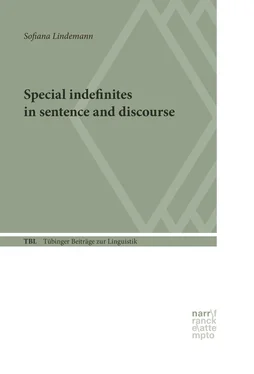The special indefinites analysed here do not only facilitate comprehension by functioning as processing signals that help establish local coherence, but also by triggering predictions about the upcoming discourse structure. The findings reported here can be interpreted as evidence for the relevance of anticipation of discourse structure in discourse processing. Language users create specific expectations of discourse structure based on cues in the preceding context. The present investigation also addresses a gap in psycholinguistic research: While there has been a wealth of research on syntactic and semantic processing, few psycholinguistic studies focused on discourse processing. The reason for this exclusion may have been the perception that larger discourse units are too complex and unpredictable.
Many behavioural, neural and psycholinguistic studies suggest that we predict probabilistically at multiple levels and layers of representations (Jackendoff 1987, Tabossi 1988, Levy 2008). The results presented here can be best accommodated in an expectancy-based, forward-looking model of language processing, which assumes that processing is predictive as speakers use different signals to indicate to their hearers what to expect next. However, compared to previous accounts on language expectation or anticipation, the approach introduced in Chapter 2 makes an essential distinction between two main types of expectations, which are triggered by different factors at different levels of linguistic representation. The first type of expectation, which is generally discussed in the literature on pronoun resolution in terms of accessibility, can be derived from structural factors such as a particular syntactic position and a certain argument structure. Based on such factors, hearers make probabilistic expectations about those referents that are more probable to be mentioned next and more likely to be pronominalized. The second type of expectation comes about by discourse structuring devices such as the three types of indefinite noun phrases discussed in this book. Such linguistic devices target larger discourse units in that they indicate which referent will be mentioned over lager discourse segments. It is important to note that the discourse structuring potential is not to be confounded with accessibility or activation, as different types of referring expressions that are associated with a high discourse structuring potential are not necessarily more activated or accessible compared to referring expressions that are not associated with a discourse structuring potential. Moreover, I argue that the expectancy of continuation (i.e. the forward pointing potential) is a property defining (in)definite noun phrases, but that at the same time it is a fine-grained feature that differentiates between several sub-types of such expressions. A referent mentioned for the first time by means of an indefinite noun phrase is more or less prone to be mentioned again in the following discourse. Besides showing referential persistence, indefinite noun phrases associated with a high discourse structuring potential are additionally more prone to become the topic in the subsequent discourse. Moreover, I will show that the three languages under investigation do not differ with respect to the expectations they yield, as both sentence-by-sentence effects and discourse structuring effects are realized. What is different is the formal marking employed by each language for each function and the relative weighting that languages assign to each of them. The main suggestion resulting from the presented evidence is that expectancy operates in parallel at different levels of representation.
On a more general level, this book explores the way in which language users generate expectations at discourse level and how these expectations impact the way the discourse unfolds. It is unanimously accepted that people actively predict upcoming sounds, words, syntactic configurations, or events. Reseach to date has investgated how anticipative processing modulates discourse relations that hold within a sentence or between two adjacent sentences. Whether anticipatory processing takes place in larger discourse units, which linguistic factors or cues guide this processing, how predictions manifest themselves at discourse level and how these global-level predictions interact with sentence-level predictions is still not known up to now. The studies reported in this book target both local (i.e. between adjacent sentences) and global (i.e. between more than two adjacent sentences) discourse processing to investigate how the anticipation of coreference and topic establishment extend to larger discourse units.
1.3 Limitations of the investigation
Before presenting the outline of this book, I will enumerate several limitations of this investigation. First, this book is focused on the semantic and discourse-pragmatic functions of indefinite noun phrases. While I will include brief discussions on other types of referring expressions, especially when dealing with notions such as activation, accessibility and topicality, future research will show to what extend the analysis put forth in this book is applicable to other types of referring expressions as well. More recent investigations on the discourse-pragmatic effects of pe -marking as differential object marking in Romanian (Lindemann 2018) bring promising evidence for an analysis of definite noun phrases in terms of discourse structuring devices as well.
Second, I restrict my analysis to indefinite noun phrases found in direct object position and do not discuss the semantic and discourse-pragmatic contribution of indefinites in subject position. One of the reasons that contributed to this decision is the intention to compare the observations and experimental results from the three languages under scrutinity. As Romanian pe -marking only occurs with direct objects, I limited the analysis of indefinite this in English and so’n in German to their distribution in direct object position. Another reason for concentrating on the direct object position is due to the well-attested bias of subject referents to be associated with highly accessible referents and of direct object referents to be associated with less accessible referents. Previous research has neglected the investigation of referents associated with less accessible referents, or has tested them indirectly, by comparison to the most accessible referent in the sentence. Thus, the results put forth here provide novel insights into the ranking of referents and the factors that contribute to this ranking in multi-sentence contexts.
In the remainder of this introductory part, I present the outline of this book. Chapter 2 reviews research on the discourse properties of different types of referring expressions, which will be important for the investigation of the indefinite noun phrases discussed in Chapters 3-5. The accounts presented in this Chapter differ in many respects, but one of their common denominators is the notion of accessibility. The proponents of the first account I discuss analyse accessibility in terms of attention or cognitive activation (Chafe 1975, Ariel 1988 and Gundel et al. 1993), while the second account to accessibility investigates it in terms of topicality (Givón 1983, Grosz, Joshi and Scott 1995, Walker, Joshi and Prince 1998). In this book, I will adopt an expectancy-driven view to accessibility (Arnold 1998, 2010, Kehler, Kertz, Rohde and Elman 2008), as this model distinguishes between two types of expectancies: (i) expectancies with respect to the referent that will be mentioned next and (ii) expectancies with respect to the type of referring expression used for a particular referent. Most crucial for the present investigation is the fact that an expectancy-driven account allows for an analysis of the referents of indefinite noun phrases in terms of discourse structuring devices.
Читать дальше












